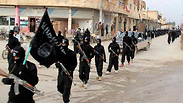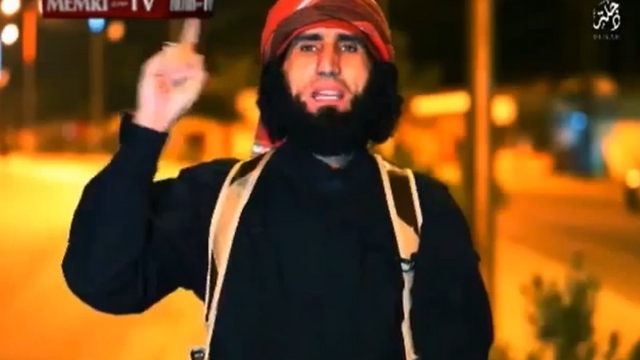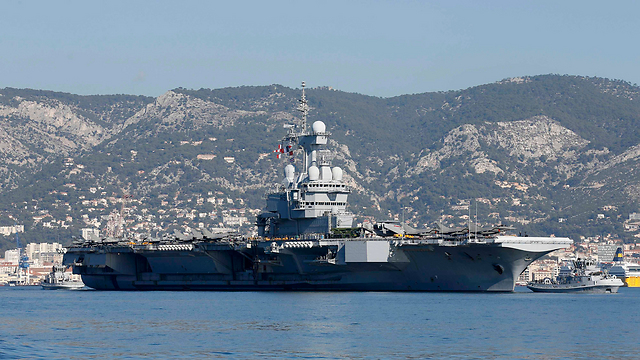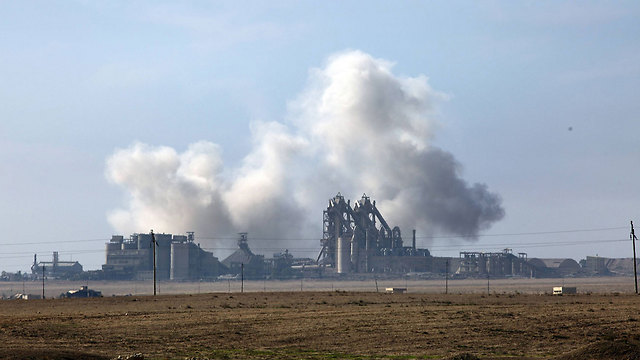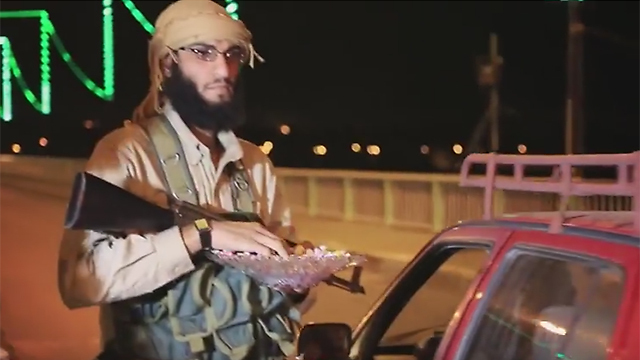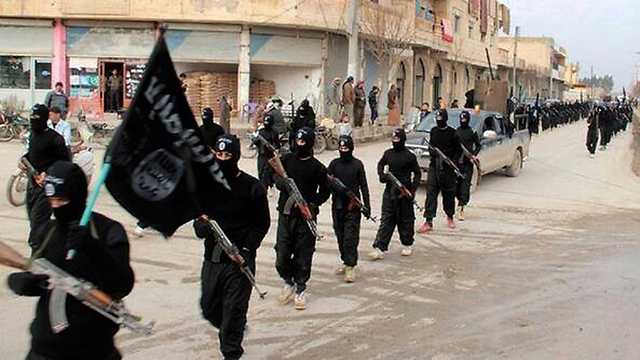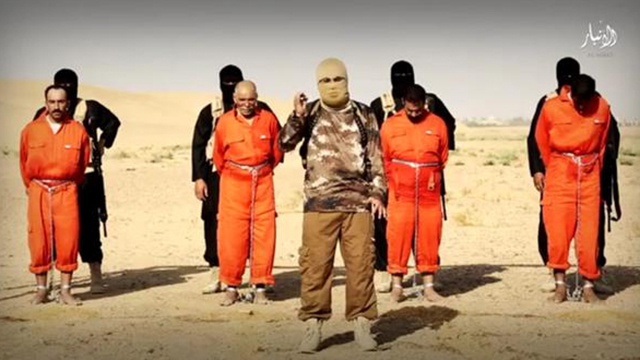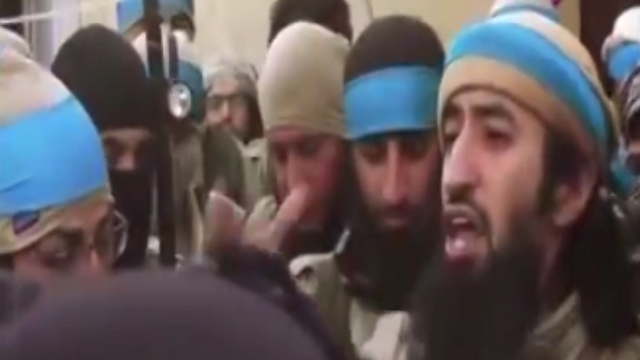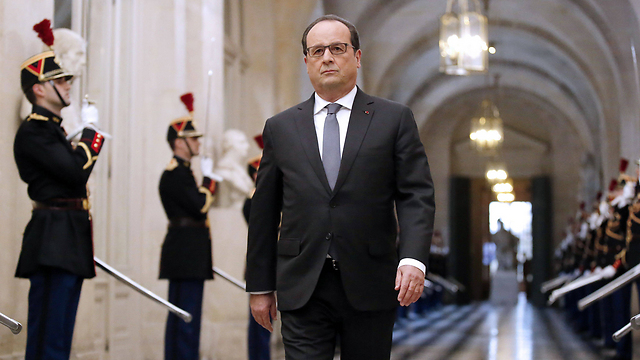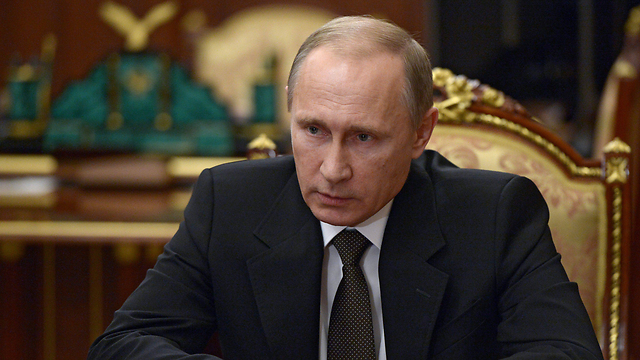The Islamic State's original plan was to commit a series of terror attacks at the same time in several European capitals. It was no coincidence that British Prime Minister David Cameron and German Chancellor Angela Merkel convened their war councils right after the attacks in Paris. And this isn't routine operations. Europe's intelligence agencies have yet to expose the ISIS network on the continent, which is why no country is willing to take any chances. Flights, concerts and sports matches have been canceled in quick succession, and it's only the beginning.
It is yet unclear why the plan for the bigger attack wasn't executed, and it's likely that if indeed such a wide network of ISIS operative exists in several European capitals, something went wrong somewhere along the way. There is a real concern that the terrorists and the weapons they were going to use are still out there and that they might act at any given moment, but that at present someone is stopping them from doing so.
And this isn't the only thing that went wrong in ISIS' plans. The main terror attack in Paris was supposed to take place at the Stade de France stadium, where tens of thousands of spectators were watching a friendly between France and Germany. Suicide bombers were planning to blow up inside this massive crowd and kill hundreds. The opening act, that was scheduled to take place at 9:20pm, was supposed to strike the French with shock. Immediately after that, as the entire city is paralyzed by the massive disaster, three or four other terror attacks were due to take place in public places in the city, like the theater and cafes.
But the terrorists, who were supposed to enter the stadium through several different gates, failed. The first blew up at Gate B at the designated time: 9:20pm. Ten minutes later, another terrorist tried to get inside the stadium through Gate H, and also failed. He simply ran into security guards - a phenomenon mostly unfamiliar in Europe, except in stadiums where they need security to deal with hooligans. It's only now that Europe is beginning to wondering about basic security.
On Monday, Defense Minister Moshe Ya'alon met with the ambassadors of NATO states to Israel - the French, the British, the American and even a representative from the Turkish embassy. There was a very somber atmosphere in the room. Ya'alon spoke about the need for moral clarity, and asked them to stop being afraid to say the words "political Islam" and "Islamic jihad" out loud. This isn't a social problem, he told them. This is a war between civilizations. The Islamic jihad declared a war against us all, and other than ISIS, there is also the Muslim Brotherhood and others, who are seeking to force their religion on the entire world.
The ambassadors were more interested in the operative side of things, in defense and security measures. They wanted to know how to balance human rights with security needs, talked about sensitive issues like listening on civilians, and politely noted down what was said in the meeting for the reports they're sending back home. There was no indication that the NATO members were on their way to fight for their lives. More so, no one in Europe would even imagine the possibility of sifting through someone's bag at the entrance to the supermarket.
Not budging from the Golan Heights
At the beginning of the week, a very important event happened on the Israel-Syria-Jordan border that did not receive much media attention. The Islamic State, that controls the closest area to the Israel border in the Syrian Golan Heights, suffered a severe blow and lost its entire top command in the area in one fell swoop. The story is that a suicide bomber from a rival group infiltrated a meeting at the headquarters of the Yarmouk Martyrs Brigade, an organization that swore allegiance to ISIS, and blew himself up, taking everyone in the room down with him. The Yarmouk Martyrs Brigade, which numbers some 700 militants, was a thorn not only in Israel's side, but also for Jordan, the Druze in the area and Syrian opposition groups. Someone among these players decided to get rid of them.
So far, Israel has not had any problems with the Islamic State's presence in the Golan Heights. Despite the spillover fire from Syria into Israel during the bloody civil war raging in the country, not a single bullet was fired by militants of the Islamic caliphate. And yet - their mere presence in the area created constant tension and a constant state of alert on the Israeli side. Now, battles are being waged between the men of the Yarmouk Martyrs Brigade and the fighters of the Nusra Front, who are affiliated to al-Qaeda, and many are hurt on the ground. It is not unlikely that the deadly attack that took out the Yarmouk Martyrs Brigade's leadership in the area was actually a sign marking the end of ISIS control of the Golan.
Nadal Salah, a resident of Jaljulia who crossed the border into Syria on October 24 on a paraglider, joined the Yarmouk Martyrs Brigade. It is unclear what happened to him. This week, it turned out that he contacted the Syrian organization using the internet, and that, along with his friends, was supposed to join the ISIS outpost in the Golan and become part of the new Islamic caliphate.
Intelligence professionals are trying to understand if ISIS's transference from "lone wolf" terror attacks – like those at Charlie Hebdo and the Hyper Casher in January 2015 – to large-scale, instituted, properly organized attacks is due to its failure in confrontations with coalition forces in Iraq and Syria. The apparent conclusion, in Israel as well, is that the two aren't connected. The tactical failures in the field don't bring about strategic cganges in this organization. They're here to stay, and murderous terror attacks overseas are part of the strategy.
Behind the Paris attack stands a very organized mechanism of overseas attacks, at the head of which stand guerrilla fighting experts who originate mostly from the Caucasus area. ISIS has about 2,000 fighters from the former Soviet Union. Their military commander, Abu Omar al-Shishani, is a Chechen citizen.
Abu Bakr al-Baghdadi, who founded ISISI, is an Iraqi man from Samarra, born in 1971. Besides being a man of religion, he's considered a very practical person, with a high capacity for operative thinking grounded in reality. Back in 2010, when he was still part of Al-Qaeda's leadership, he started cultivating a presence on social media in order to recruit Muslims from all over the world to the struggle.
These days he publishes a "yearly book" in which you can see all of the organizations' actions in detail. The Americans, who follow this publication, say that there's a high degree of accuracy in the statistics that appear there.
Al-Baghdadi himself spent a significant part of his life in the ”Fedayeen Saddam" forces, which Iraq's then-President operated against his Shiite enemies. The practice of beheading comes from there. Most of the people who are around Baghdadi today sat with him in American prison camps after the Second Gulf War, where the stew of hatred that gave birth to ISIS was cooked.
Along with his people, he created a two-phase doctrine. The first – kicking the Americans out of Iraq and establishing an Islamic caliphate on part of the country's territory. In the second phase, the caliphate is supposed to include Egypt, Lebanon, Jordan, Syria, Israel, and parts of Iraq. The entire Muslim world outside of that will be considered the periphery of the caliphate. Iraq today is just a springboard. Al-Raqqah in Syria is just a temporary capital. It's likely that if Damascus were to be conquered by ISIS – it would become its capital.
The Palestinians are less of a concern for ISIS, even though 15 percent of the West Bank's youth expresses sympathy towards the organization in polls. ISIS considered the Palestinian Authority, which speaks of a democratic state beside Israel, as abominable. It sent out a video a few weeks ago with threats towards Israel, but only after Ayman al-Zawahri, leader of their chief competitor Al-Qaeda, accused al-Baghdadi of neglecting the Palestinian matter.
So for those who are worried: They'll reach us, but only in the final stage of the caliphate's establishment. These days, the caliphate rules over areas in Iraq and Syria where about six million people live. Research done on the degree of sovereignty the hold in the two major cities under their control – Al-Raqqah in Syria and Mosul in Iraq – show that in all governmental parameters, things are better there than they were under the Iraqi or Syrian regimes, and that citizen services are better too.
Alongside all of the horror stories, it's important to remember that ISIS can't hold an area without the populace's support, which it probably has. At least that's the case with the Sunni populace. After the initial escape of frightened Mosul residents, the city's population was cut in half, to a million residents. The city's functioning and the people get elementary cervices like water and electricity, which function better than they did before.
In Al-Raqqah there are dams that connect to power plants, where formerly-Syrian administrators work, still paid by the Syrian government. Moreover, up until three months ago the Iraqis and Americans gave money to run Iraq's ISIS-run districts, in order to prevent harming the population. And then they understood that in their foolishness they were giving money to ISIS, and stopped.
AL-Raqqah is home to the high staff of ISIS leaders – state and military. That's also where the Shura Council is supposed to be, which dictates all aspects of life to the caliphate's citizens. Beneath it operate the bureaucratic councils responsible for public services, agriculture, healthcare and the military council. At Baghdadi's side sit two councils, one responsible for Islamic State affairs in Iraq, and one responsible for Syria.
Islamic State districts are based upon the districts that existed in Syria and Iraq before ISIS took them over. Each one has a governor with independent rule over matters of law, law enforcement, implementing Sharia law, education, and healthcare.
Each governor has a battalion-sized military force under his command, which he can use independently to exercise his rule over the area. For instance, if he decides to conquer a gas field so that the district can enjoy the economic benefits he doesn't require the approval of leadership in Al-Raqqah. There are also districts, Damascus for instance, where ISIS still has a tough time establishing all of the all of their institutions due to ongoing fighting.
The French report revenge bombings in Al-Raqqah, but the known targets there have already been bombed by the Americans during the past year. Each time a worthy target was identified – it was bombed. The French have apparently been striking at civil institutions in the city.
Beyond districts in Iraq and Syria, ISIS also has its districts all over the globe. These are fundamentalist organizations in Egypt's Sinai region, Gaza, India, Libya, Nigeria, the far east, the Arabian peninsula, Chechnya, China, and Boko Haram in Africa. Some of these organizations were formerly identified with Al-Qaeda, and have shifted their loyalties over to the Islamic State.
The central leadership's connection to the districts in Iraq and Syria is maintained by "ambassadors", who communicate between leadership and local governors. Contact with more remote districts is done by way of the most advanced communications you can imagine. Envoys from the central districts have more than once been sent out to aid more distant ones. For instance, Boko Haram was visited by a delegation in Nigeria, which aimed to help them improve their ability to produce videos.
Throughout the year, there were also reports of visits the caliph's deputy, Abu Ala al-Afri, mad to Libya, which is also developing into an major ISIS district. Professionals say that if the West manages to get ISIS out of the Middle East, Libya will be a temporary replacement home for the caliphate.
A wave of volunteers
The hard core of ISIS started to take shape in the past decade, in Iraq's Sunni districts. Some of the people were removed from military and government ranks back then during the "clean-up" done in Iraqi institutions by occupying American forces. These people include professionals in all military fields, including chemical materials, large rockets, and tanks – who served in Saddam Hussein's military. The organization began accumulating weapons during its move from Iraq to Syria, when it was being pushed by Sunni tribes that the Americans managed to buy with large money sums and promises of shared power.
ISIS's people arrived in Syria in 2011, right into the chaos of the Arab Spring, where it started to blossom militarily. ISIS began conquering Syrian bases, accumulating heavy weapons, and in 2014 it returned to Iraq triumphantly, culminating in it conquering the country's second-largest city, Mosul.
ISIS's methodology on eve of conquering Mosul is reminiscent of its current method of penetrating Europe. Its people begun infiltrating sympathetic Sunni communities, which were being oppressed by the Shiite-led Iraqi military, long before the first ISIS artillery regiment came over with weapons they robbed from the Syrian military.
ISIS's people weaved themselves into Mosul, and managed to build up an economic system which was based on extorting protection money. At the moment of truth, they simply collapsed Mosul from the inside. That's also how they operate in Europe as well. Its activists sit in the Muslim immigrant neighborhoods and await their orders.
Al-Baghdadi's dream of an Islamic caliphate drew about 15,000 volunteers from all over the world into the ranks of ISIS, 6,000 of them from Tunisia. Women from Tunisia also come over to strengthen the fighters before they go out to battle, and a controversy broke out in the local parliament when 30 of them came back pregnant with an unknown man's baby.
4,000 more volunteers came from Saudi Arabia, 750 from Jordan, and 500 from Yemen. Europe didn't stay behind: 1,500 made their way over from England, 1,200 from France, and 600 from Belgium. Only recently have the Turks started to put up obstacles on their joint border crossing with Syria, and so far the number of volunteers hasn't gone down.
Some of them come to fight, others answer al-Baghdadi's call to take part in erecting the caliphate as engineers, managers, teachers, and doctors. Arab Israelis have also fallen in this trap, and as of today there are about 50 of them who are known to be members of ISIS. A few dozen others have been arrested in the past two years trying to establish Islamic State cells in Israel, or on suspicion of intention to join its ranks.
According to intelligence bodies' most careful assessments, ISIS has over 30,000 fighters. The dream of bringing Islam back to its glory days attracts Muslim youth from all over the world. ISIS's main income source, the oil it extracts from the ground in Syria and Iraq, keeps flowing in, Mosul being home to 15 percent of Iraq's oil reserves. Up until a few months ago the Turkish government purchased this oil, officially, and filled ISIS's coffers. Turkey's current agreement to halt these purchases is also a fraud, since they continue to work with ISIS's mediators, and the money goes towards the activities of ISIS.
Another blow to ISIS's oil industry was the takeover of the city of Baiji by the Iraqi military in late October 2015. The Russians also joined the hunt on oil convoys this week, with their military's head of operations clarifying that pilots have been given free reign to fire on ISIS targets, including oil tankers.
The Americans have tried to contribute their own efforts, with their special forces sent to assassinate the lead ISIS economist, Abu Sayyaf, in his Syria home.
Just this week, for the first time, American A-10 planes struck an oil tanker convoy identified as belonging to ISIS, while it was making its way towards the Turkish border. If this income source is damaged – the Islamic State will be in trouble. The intensive fighting and lower incomes are already making the caliphate face a dilemma – invest in security or lower the level of services to the population. So far, there has been a recorded lowering in the level of services, but not one that endangers ISIS's rule.
The aerial attacks have harmed ISIS's ability to move freely, and that's why it has stopped spreading. Sinjar, a strategic point on the axis that connects Syria and Iraq, has been taken back, thus disconnecting the direct territorial path from Mosul and Al-Raqqah.
Many of the organization's people are out of uniform these days, blending in with the civilian populace, and it seems like the desired result can only be achieved with a ground invasion. All in all, in two years of fighting ISIS has lost about 10,000 people, who were killed in airstrikes and ground battles. But the amount of fighters isn't going down, because of the volunteers that keep coming and the draft that the organization has enacted – a man from each house under its rule.
Until the Messiah comes
ISIS's recent failures equal its successes. On one hand - the terror attacks in Paris, the bombing of the Russian plane in the Sinai, the bombing in the heart of Beirut and several achievements on the Aleppo-Damascus route. On the other hand – a retreat in Iraq, under pressure of the Iraqi military, the Kurds, and the Siite militias.
Meanwhile, the Americans have lost one of their most important tools for fighting in Syria – covert action. The special forces, in conjunction with the CIA, have excelled in penetrating and operating locals in the past. But the current regime, in a clear decision, has neglected this branch in Syria and avoided opposition sources, such as the Free Syrian Army, which has begged for help.
There's no connection between ISIS's failures in battle and their achievements in executing terror attacks around the world, just as there's no connection between the wave of Syrian refugees and ISIS's European infrastructure, which was built years ago. The opposite is true – in its publications, ISIS speaks against the Syrian people leaving their homeland for Europe, seeing it as a betrayal of the Islamic State. The refugees are also warned that their fate among the infidels will be worse than under the caliphate.
Dr. Barak Mendelsohn, an expert on world jihad movements from Haberford College in Pennsylvania, recently published a book which deals with the spread of world jihad and its implications. Mendelsohn says that the large-scale terror attacks in Europe, and other places, will go on, since they are meant to force European Muslims to choose a side and create a divide between the Muslim and non-Muslim populations.
The people of ISIS actually support the rise of right-wing movements in Europe, hoping that it will encourage Muslims to rise against them. It wants the large-scale attacks to continue – among other reasons, to encourage more Muslim youths to join the organization, and also because of the deterrent effect they are supposed to create in the face of European countries that are participating in fighting against it in Syria and Iraq. And yes, there's also revenge.
Mendelsohn believes ISIS is making the same mistakes that al-Qaeda made on September 11th in the United States. "They aren't assessing the feelings in the West correctly," he says. "They are in an ideological mindset which says the terror attacks will force the Christians to come to the Levant and fight them in the holy land, until that decisive battle in the town of Dabek in northern Syria, after which the Christians will be defeated and the messiah will rise out of his grave."













